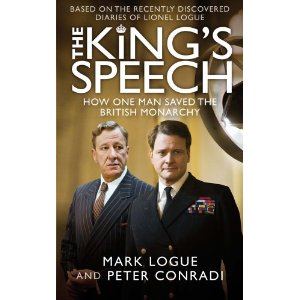 Well, it took me awhile, but I finally finished reading The King's Speech. It probably seems like an odd choice, especially after I said in my first post that I don't read a lot of non-fiction. That's generally true... but after watching the film again over Christmas I thought I would give it a try.
Well, it took me awhile, but I finally finished reading The King's Speech. It probably seems like an odd choice, especially after I said in my first post that I don't read a lot of non-fiction. That's generally true... but after watching the film again over Christmas I thought I would give it a try.
For those who haven't heard of either book or film (if there are any), it focuses on King George VI and his relationship with Australian immigrant Lionel Logue, who spent many years as the King's speech therapist, coaching him through the numerous speeches he was obligated to make, first as the Duke of York and later as King, despite a stammer which had plagued him since childhood.
Even before I started I was braced for the fact that the film would have changed certain things for dramatic effect, and that the book would be a little blander (for lack of a better word) by comparison. But having said that, there was plenty to interest me. The book is crammed full of extracts from letters exchanged between the King and Logue, which were fascinating to read. The authors also included plenty of newspaper articles, diary extracts, some photos and even transcripts of some of the speeches made by the King. In terms of story, apart from the details of how Logue helped the King to overcome his stammer, there is plenty of space given to the background of Logue and how he and his family came to live in the UK. We are given a history lesson on the royal family and I particularly enjoyed reading about the abdication of Edward VIII. The detail continues through to talking about World War II and the effect it had on the people of London. Finally, the authors talk about the declining health of the two men and ends on a note from Lionel's daughter-in-law and thoughts on how he was able to so successfully help the King to become the great orator he was known as.
I'd be lying, however, if I said I didn't find certain aspects of the book a little repetitive. Strangely, it was the parts involving the King's speeches which tended to drag the most for me. There are only so many times I can read how Logue was summoned to the palace, helped the King prepare and then congratulated the King on a job well done. It doesn't help that these parts usually contain very little detail, and so nothing makes them stand out. There were a few exceptions, however, such as the speech delivered at the beginning of WW2, which provided the climax of the film and stands out here partly because they include the entire speech.
It was also a shame not to have more detail on the sessions that took place between Logue and the King, although the reasons for this are given early in the book. It would have been interesting to read about some of the techniques used and perhaps gain more insight into the interaction between the two men. Perhaps this expectation is partly due to the film, which shows a montage of various speech therapy techniques and several times had Logue and the King interacting in a more personal way. Obviously most of what is seen is either speculation or outright fabrication, and what we are left with in the book is a more understated friendship which can only really be appreciated when you consider that Logue was a commoner, and therefore even exchanging letters with the King was testament to their closeness.
0 comments:
Post a Comment